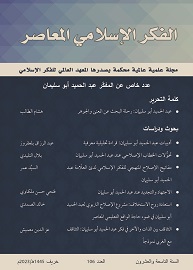Abstract
This article sheds light on the tajdīd (renewal) efforts of AbdulHamid AbuSulayman and what distinguishes him from others in his approach to tajdīd. It thus attempts to capture the methodological underpinnings of tajdīd in AbuSulayman’s life and thought, and it demonstrates how tajdīd and other pertinent concepts such as ijtihād are employed by him. The article contends that AbuSulayman’s intellectual contribution in regard to tajdīd comes in the context of the “Islamization of Knowledge” movement: a movement that offers a philosophical and methodological approach critical for renewal, revision, and purification. The article also juxtaposes AbuSulayman’s approach to tajdīd and the Islamization of Knowledge to that of two other prominent Muslim thinkers who devoted their efforts to these, Ismail al-Faruqi and Taha Jabir Al-Alwani. It contends that distinguishing AbuSulayman’s work is his focus on what he held to be the essence of the Ummah’s crisis: the crisis of the Muslim mind, will, and conscience, and that of not prioritizing the family and childhood education. Furthermore, the study shows how AbuSulayman’s project to change the Ummah’s abysmal conditions relies on a notion of tajdīd that is dynamic and multifaceted and includes such concepts as iṣlāḥ (reform), iʿādat al-binā’ (reconstruction), taghyīr (change), baʿth (resurrection), iḥyā’ (revival), and ibdāʿ (creativity); and it argues, as such, that crucial to AbuSulayman’s legal thought is reviving the practice of ijtihād.

This work is licensed under a Creative Commons Attribution-NonCommercial-NoDerivatives 4.0 International License.
Copyright (c) 2023 المعهد العالمي للفكر الإسلامي





